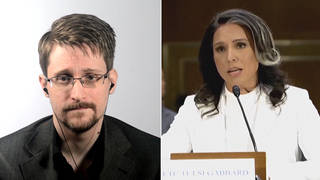
Topics
Attorney General Alberto Gonzales is facing a possible perjury investigation over his sworn testimony on the Bush administration’s domestic spy program. Gonzales faces scrutiny over his insistence that a March 2004 meeting with congressional leaders was not called to address the warrantless spying. Gonzales was questioned during a testy Senate Judiciary Committee hearing Tuesday on misconduct at the Department of Justice. [includes rush transcript]
Transcript
AMY GOODMAN: We move now back to national politics in the United States: Alberto Gonzales. Juan?
JUAN GONZALEZ: Yes, well, the attorney general, Alberto Gonzales, is facing a possible perjury investigation over his sworn testimony on the Bush administration’s domestic spy program. On Wednesday, Senate Judiciary Chair Patrick Leahy said he may request the probe over Gonzales’s insistence that a March 2004 meeting with congressional leaders was not called to address the warrantless spying. Several lawmakers in attendance have denied Gonzales’s account. And newly released documents show then-Director of National Intelligence John Negroponte later described the meeting as a “briefing on the Terrorist Surveillance Program,” the same name administration officials use to describe the warrantless spying. Leahy says he will give Gonzales until next week to revise his testimony.
AMY GOODMAN: Gonzales’s latest public claims came during a testy Senate Judiciary Committee hearing Tuesday on misconduct at the Department of Justice. Angry senators accused the attorney general of providing deliberately misleading testimony about warantless surveillance, the politically motivated firing of U.S. attorneys and the Bush administration’s use of torture.
We’ll watch some of those excerpts now. This is Illinois Democratic Senator Richard Durbin questioning the attorney general on torture.
SEN. RICHARD DURBIN: I think that this administration and your tenure as attorney general will be haunted in history by another issue, and that’s the issue of torture — is the reason I couldn’t vote for your confirmation, the role that you played as counsel to the president in saying that we as a nation did not have to follow the torture statute and the provisions of the Geneva Conventions.
Now, last Friday, President Bush signed an executive order, interpreting Common Article 3 of the Geneva Conventions for the purposes of CIA’s secret detention interrogation techniques. The executive order rejected your earlier position and acknowledges that the CIA must follow applicable law, including Common Article 3 of the Geneva Convention, the torture statute, and the McCain torture amendment, which I was happy to co-sponsor.
Do you now agree that Common Article 3 applies to all detainees held by the United States?
ALBERTO GONZALES: What I can say is, is that certainly Common Article 3 applies to all detainees held by the United States in our conflict with al-Qaeda.
SEN. RICHARD DURBIN: In —- I’m sorry, what’s -—
ALBERTO GONZALES: In our conflict with al-Qaeda, yes.
SEN. RICHARD DURBIN: Well, I’m worried about the qualification at the end. Are you suggesting that other terrorist conflicts are not covered by Common Article 3, in terms of the treatment of detainees?
ALBERTO GONZALES: You know, we have to look at the words of Common Article 3. The Supreme Court rendered a decision about the application of Common Article 3 with respect to our conflict with al-Qaeda only. And so, I believe, if I recall correctly, if that were the case, if there were a different kind of conflict that on its face isn’t covered by Common Article 3, then obviously we would not be legally bound by Common Article 3, although I think the president has said we’re going to treat people humanely nonetheless.
SEN. RICHARD DURBIN: So let me get into a specific here. Last year, the highest-ranking attorneys in each of the four military services — Army, Navy, Air Force and Marines — the judge advocates general testified before this committee, and I sent them follow-up questions, asking their opinion about specific abusive interrogation techniques that this administration has reportedly authorized.
AMY GOODMAN: Senator Durbin questioning the attorney general of the United States, Alberto Gonzales.












Media Options